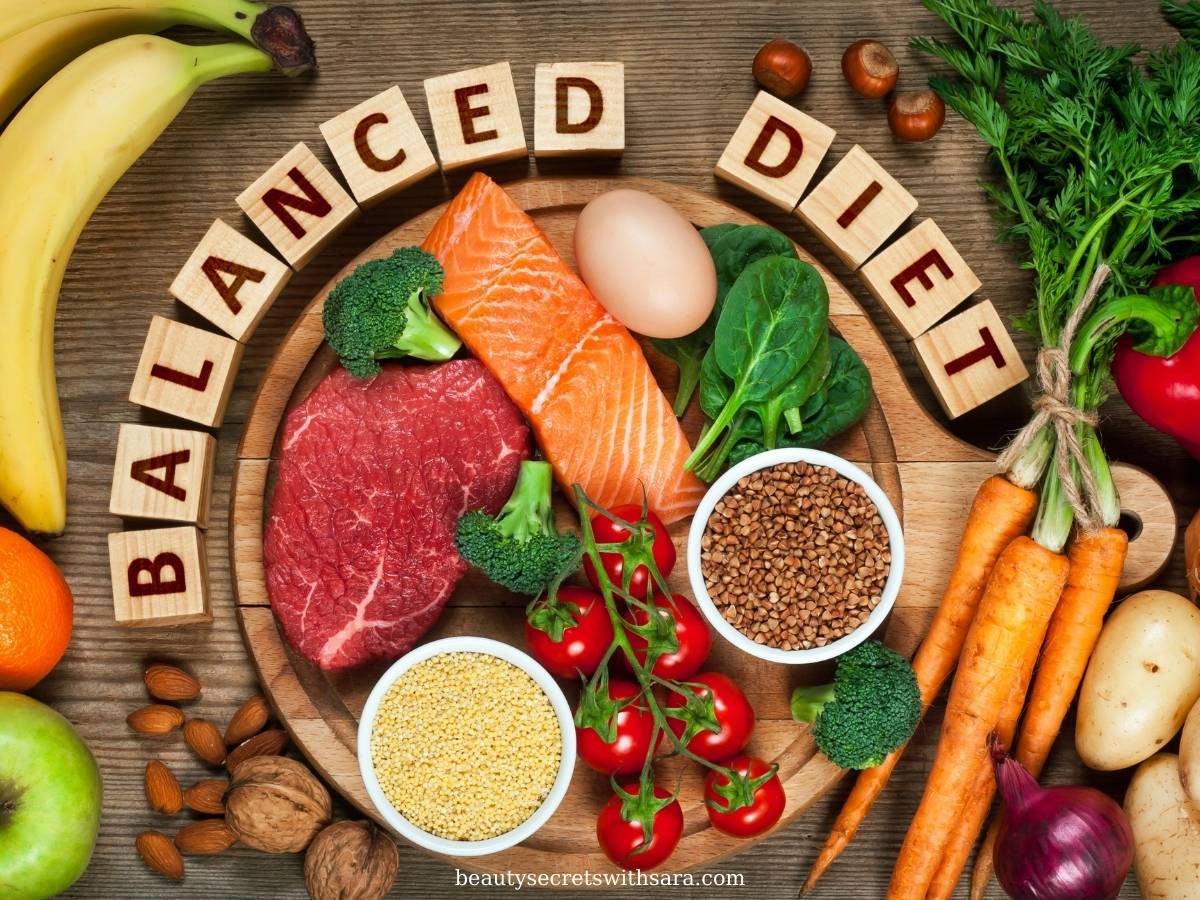This article delves into whether are there any healthy foods that someone should never eat? and identifies specific food items that can be detrimental to your health when overindulged.

Create Image Design in Canva Pro
In the quest for a healthier lifestyle, it’s essential to recognize the importance of a well-balanced diet. While the focus often falls on including nutrient-rich foods, it’s equally vital to be aware of certain items that should be consumed in moderation, but the question is are there any healthy foods that someone should never eat?
In This Article
Understanding Healthy Eating
Are there any healthy foods that someone should never eat? Before we explore the foods to be cautious of, let’s establish a fundamental understanding of healthy eating. A well-balanced diet typically consists of various fruits, vegetables, lean proteins, whole grains, and healthy fats.
It’s also important to keep an eye on portion sizes and moderation. Even though certain foods have health benefits, consuming them excessively can negate their positive effects.
The Importance of Individuality in Nutrition
It’s important to note that what may be unhealthy for one person could be perfectly fine for another. The key to a healthy diet is understanding your individual nutritional needs and making informed choices.
Don’t blindly follow food trends or dietary advice. Instead, consult with a healthcare professional or registered dietitian to create a personalized nutrition plan that suits your specific requirements.
Are There Any Healthy Foods That Someone Should Never Eat?
Are there any healthy foods that someone should never eat? There is no definitive answer to this question, as different foods may affect different people in different ways.
However, some general guidelines for choosing are there any healthy foods that someone should never eat are:
- Avoid processed foods that contain artificial ingredients, added sugars, trans fats, and excessive sodium. These foods are often low in nutrients and high in calories, and may increase the risk of chronic diseases such as diabetes, heart disease, and obesity (4),(5).
- Limit your intake of animal products, especially red meat, organ meats, and seafood. These foods are high in purines, which are substances that break down into uric acid in the body. Excess uric acid can cause gout, a painful form of arthritis (6).
- Choose whole grains over refined grains. Whole grains contain more fiber, vitamins, minerals, and phytochemicals than refined grains, which have been stripped of their bran and germ. Fiber helps lower cholesterol, regulate blood sugar, and prevent constipation(4),(5).
- Eat a variety of fruits and vegetables every day. Fruits and vegetables are rich in antioxidants, which protect the cells from damage caused by free radicals. They also provide vitamins, minerals, and fiber that support various bodily functions. Aim for at least five servings of fruits and vegetables per day, and choose different colors to get a range of phytochemicals(4),(5).
- Drink plenty of water and limit your intake of alcohol and caffeinated beverages. Water helps flush out toxins, hydrate the skin, and regulate body temperature. Alcohol and caffeine can dehydrate the body, interfere with sleep quality, and affect mood and cognition(4),(5).
TIPS: These are some general tips for choosing healthy foods, but remember that everyone's needs and preferences may vary. The best way to find out what works for you is to consult a registered dietitian or a doctor who can give you personalized advice based on your medical history, lifestyle, and goals.
Read More: GREEN TEA FOR WEIGHT LOSS RECIPE
How can I make my Diet more Balanced?
A balanced diet is one that provides your body with the nutrients it needs to function properly and prevent diseases. To make your diet more balanced, you can follow these tips:

Create Image Design in Canva Pro
- Eat a variety of foods from different food groups.
This will ensure that you get a range of vitamins, minerals, antioxidants, and phytochemicals that support your health. The Eatwell Guide shows the proportions of different food groups that you should aim for in your diet.
- Choose whole grains over refined grains.
Whole grains contain more fiber, which helps lower cholesterol, regulate blood sugar, and prevent constipation. They also have more nutrients and phytochemicals than refined grains, which have been stripped of their bran and germ. Examples of whole grains are whole wheat bread, brown rice, oats, quinoa, and barley (1),(2).
- Eat more fruits and vegetables.
Fruits and vegetables are rich in antioxidants, which protect your cells from damage caused by free radicals. They also provide vitamins, minerals, and fiber that support various bodily functions. Aim for at least five servings of fruits and vegetables per day, and choose different colors to get a range of phytochemicals (1),(2),(3).
- Eat more fish, especially oily fish.
Fish is a good source of protein and omega-3 fatty acids, which may help prevent heart disease. Oily fish, such as salmon, trout, herring, sardines, and mackerel, are particularly high in omega-3s. Aim to eat at least two portions of fish a week, including at least one portion of oily fish (2),(3).
- Limit your intake of saturated fat, trans fat, salt, and added sugar.
These substances can increase your risk of obesity, diabetes, heart disease, stroke, and some cancers. Saturated fat is found mainly in animal products, such as butter, cheese, cream, fatty meats, and pastries. Trans fat is found mainly in processed foods, such as cakes, cookies, donuts, pies, and margarine.
Salt is added to many foods during processing or cooking. Added sugar is found in many foods and drinks, such as sodas, fruit juices, candies, chocolates, and desserts (1),(2),(3).
- Drink plenty of water and limit your intake of alcohol and caffeinated beverages.
Water helps flush out toxins, hydrate the skin, and regulate body temperature. Alcohol and caffeine can dehydrate the body, interfere with sleep quality, and affect mood and cognition (1),(2).
How can I Eat more Vegetables if I don’t like them?
Eating more vegetables can be challenging if you don’t like them, but there are some ways to make it easier and more enjoyable. Here are some tips:

Create Image Design in Canva Pro
- Blend them into smoothies or soups.
You can add spinach, kale, carrots, celery, cucumber, or other vegetables to your smoothies and soups without affecting the taste too much. This way, you can get the benefits of the vitamins, minerals, antioxidants, and fiber from the vegetables (7),(8),(10).
- Use veggie noodles instead of regular pasta.
You can buy or make your own veggie noodles from zucchini, carrots, spaghetti squash, or other vegetables. They have fewer calories and carbs than regular pasta, and you can use them with your favorite sauces and toppings (7),(8).
- Bake them into chips or fries.
You can slice vegetables like kale, sweet potatoes, beets, or parsnips into thin pieces and bake them in the oven with some oil and seasonings. They will become crispy and delicious, and you can snack on them or use them as a side dish (7),(8).
- Add them to sauces, casseroles, or baked goods.
You can puree or grate vegetables and mix them into sauces, casseroles, egg dishes, meatloaf, meatballs, or even muffins, breads, or cakes. They will add moisture and texture to your dishes, and you won’t even notice them (7),(8),(9).
- Make them more flavorful.
You can enhance the taste of vegetables by adding olive oil, garlic, lemon juice, vinegar, herbs, spices, cheese, nuts, or seeds. You can also roast, grill, or sauté them to bring out their natural sweetness (7),(8),(10).
- Dip them in something tasty.
You can make vegetables more appealing by dipping them in hummus, ranch dressing, salsa, guacamole, peanut butter, or yogurt. You can also make your own dips with low-fat ingredients and seasonings(7),(8).
- Try different varieties and preparations.
You may find that you like some vegetables more than others, or that you prefer them cooked in certain ways. Experiment with different types and methods of cooking vegetables until you find what you enjoy (7),(8),(10).
These are some ways to eat more vegetables if you don't like them. I hope you find them helpful and try some of them out.
Conclusion
In conclusion, are there any healthy foods that someone should never eat? Rather, certain items should be consumed in moderation. A well-balanced diet is about variety and portion control.
While these foods can be enjoyed occasionally, overindulging can lead to various health issues. It’s essential to maintain a balanced and diverse diet for overall well-being.
Source:
(1) Eating a balanced diet – NHS. https://www.nhs.uk/live-well/eat-well/how-to-eat-a-balanced-diet/eating-a-balanced-diet/
(2) Balanced Diet: What Is It and How to Achieve It – Healthline. https://www.healthline.com/health/balanced-diet.
(3) Eating a balanced diet – NHS. https://www.nhs.uk/live-well/eat-well/how-to-eat-a-balanced-diet/eating-a-balanced-diet/.
(4) How to Prevent Kidney Stones and Improve Kidney Health: Foods to Eat and Avoid. https://www.msn.com/en-us/health/medical/how-to-prevent-kidney-stones-and-improve-kidney-health-foods-to-eat-and-avoid/ar-AA1i7mgP.
(5) Navratri Fasting Foods: Expert Lists Foods To Eat And Avoid. https://www.onlymyhealth.com/navratri-fasting-foods-to-eat-and-avoid-1697183013.
(6) Highly Processed ‘Healthy’ Foods to Avoid. https://www.msn.com/en-au/video/lifestyle/highly-processed-healthy-foods-to-avoid/vi-AA1hdXof.
(7) Twenty Ways to Eat More Vegetables If You Hate Vegetables – Lark. https://www.lark.com/resources/twenty-ways-to-eat-more-vegetables-if-you-hate-vegetables.
(8) 28 Ways to eat more vegetables even if you hate them. https://www.hisandherfipost.com/28-ways-to-eat-more-vegetables/.
(9) But I don’t like fruit or vegetables | Heart and Stroke Foundation. https://www.heartandstroke.ca/articles/but-i-dont-like-fruit-or-vegetables.
(10) Best Eating Habits for Those Who Don’t Like Vegetables. https://www.eatthis.com/best-eating-habits-dont-like-vegetables/.

